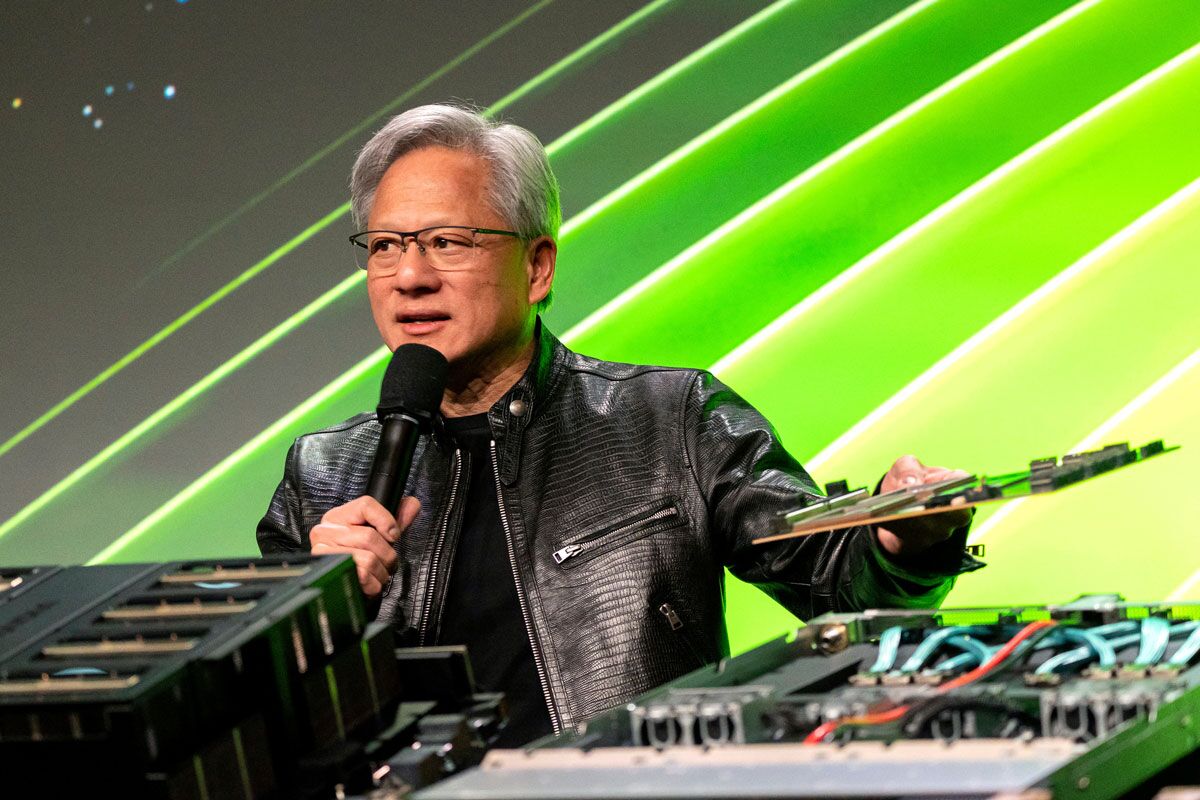(Bloomberg) — President Donald Trump met Friday with Nvidia Corp. Chief Executive Officer Jensen Huang at the White House as the US prepares tariffs on semiconductors, weighs the fate of a chip subsidy program and probes whether Chinese AI startup DeepSeek skirted export controls to obtain the company’s products.
Most Read from Bloomberg
Chip tariffs would weigh heavily on Nvidia, which relies on overseas partners to manufacture its semiconductors. Trump told reporters he’d had a good meeting with Huang, but insisted “eventually we’re going to put tariffs on chips.”
In response to a question about the potential for more restrictions on chip exports to China, the president said he will move forward with tariffs. Current limitations on shipping to China take the form of license requirements administered by the Department of Commerce.
An Nvidia spokesperson said Huang “appreciated the opportunity to meet with President Trump and discuss semiconductors and AI policy.” The two talked about “the importance of strengthening US technology and AI leadership,” the spokesperson said.
The meeting came at the end of a rocky week for Nvidia, the top maker of chips to power artificial intelligence workloads. DeepSeek released its R1 model, which is seen as competitive with chatbots from other companies at a fraction of the cost. That raised questions about the billions in planned spending to develop AI technology and whether Beijing has closed the gap with the US in the sphere.
The ensuing market reaction was particularly stark for Nvidia, with shares of the company plunging Monday in one of the biggest selloffs in history. Investors are concerned that DeepSeek’s method for developing effective AI software doesn’t require as much of the expensive gear that Nvidia sells.
Nvidia shares declined 3.7% to $120.07 at the close Friday, bringing the stock’s cumulative slide to 16% this week.
Trump administration officials have begun probing whether DeepSeek purchased banned Nvidia chips through intermediaries in Singapore, circumventing US restrictions on the sales of processors used for AI tasks, according to people familiar with the matter.
Huang’s meeting with Trump has been in the works for several weeks, according to a person familiar with the matter. The goal was to discuss AI policy, and it wasn’t prompted by the DeepSeek breakthrough, said the person, who described the plans on condition of anonymity.
The Nvidia CEO had floated meeting with Trump earlier this month, when he signaled hope for a lighter regulatory touch from the new administration. Unlike other tech leaders, including Meta Platforms Inc. CEO Mark Zuckerberg and Amazon.com Inc. co-founder Jeff Bezos, Huang skipped Trump’s inauguration in Washington and instead traveled to Asia on a long-planned trip around the Lunar New Year.
The plans for the Trump and Huang meeting were reported earlier by Gray Television News.
Friday’s sit-down was the first meeting between the pair. Nvidia is central to the AI boom, and its chips have assumed geopolitical significance in the intensifying race between the US and China over artificial intelligence.
The company has lobbied furiously in recent weeks against sweeping controls on the global sales of its processors, and Huang has expressed optimism about the possibility of easing regulatory burdens under Trump’s administration.
It will take months for Trump to fully staff the teams responsible for those policies, but there are early indications that his administration will take a tough approach on sales of US technology to China. Some Trump officials are interested in curbing exports of less-advanced chips that Nvidia sells.
Howard Lutnick, Trump’s pick for Commerce secretary, during his confirmation hearing on Wednesday suggested that DeepSeek had evaded US export controls and pledged a “very strong” response. If confirmed, Lutnick would be in charge of the Bureau of Industry and Security, which is responsible for writing and enforcing sweeping controls on sales of chips and related manufacturing equipment to China.
Trump last week unveiled a $100 billion artificial intelligence infrastructure investment — with goals of $500 billion down the road — from OpenAI, SoftBank Group Corp. and Oracle Corp.
Trump has said new “AI solutions” from the US would be introduced in the near future. On Thursday, OpenAI CEO Sam Altman teased new advances in the company’s products in a closed-door meeting in Washington attended by officials from Congress and the White House. He used the gathering to urge US policymakers to invest heavily in physical infrastructure to support artificial intelligence development.
–With assistance from Caroline Hyde, Romy Varghese and Ian King.
(Updates with comments by the president beginning in the second paragraph.)
Most Read from Bloomberg Businessweek
©2025 Bloomberg L.P.
Source link
